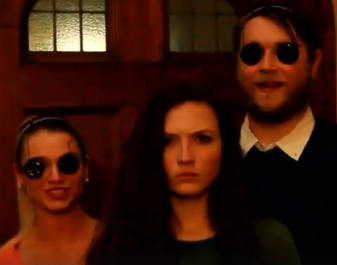|
Neil Gaiman is perhaps best-known to the general public as the author of the original novel American Gods. Years ago he’d won a World Fantasy Award for his work on the long-running Sandman comic book series. In an amidst all the many other projects he’d written for, there was a 2002 novel Coraline, which won Hugo and Nebula Awards in 2003. In 2009 it was turned into a stop-motion animated feature film. A few months after that film was released, there was a musical adaptation of the story debuted in New York. This month, that musical gets its first Wisconsin staging with Bad Example Productions.
Madeline McNichols plays the title character--a young girl who finds another world beyond a mysterious locked door in her living room. The Other World is complete with Other Parents who seem to be part of a world that is far more interesting than the one in which she was born. It’s a dark fantasy story. There are some viscerally disturbing aspects of horror in a heroic story of a very heroic young girl. The local production is the product of Bad Example’s David Kaye, who directs the show along with Music Director Donna Kummer. Kaye was nice enough to answer a couple of questions about the production a few days ago. On Facebook you’d mentioned having a big turnout for auditions for the show. What was it like selecting the cast and what has it been like working with them? Selecting the cast was actually incredibly difficult. The talent level we had come out was absolutely extraordinary. It was very much a collaboration between myself, Donna Kummer, and Jim Padovano. The accompaniment in this show can be very bizarre, so we had to find singers strong enough to hold down the song while listening to prepared piano, not an easy task. Beyond that, I always like to look for something more than pure talent. I am just as interested in what a person is like to work with. Will they show up late? Will they be more interested in gossiping and drama then doing the show? Also, do they follow instructions? Bringing a headshot and resume isn't just to see their and know what they've done, it's also a way to make sure that people can read instructions and follow them. Working with this cast has felt a little like Judy and Mickey putting on a play in a barn, in a very good way with some of the best professionals in town. There is so much collaboration. All of these actors are performers who are not afraid to make choices and try things. This fits in perfectly with my standard read through speech I like to give my performers. I tell them, "I know this script backwards and forwards, I know how I want every role played, and I am now throwing it out. I cast you because I wanted to see what you could bring to the role, and my original thoughts are our fall back plan. If it was just everything I wanted, then I'd be doing a puppet show, not directing a play." Of course... in this instance, we do have puppets. Based on a work by Neil Gaiman, CORALINE has a built-in audience. Beyond that, though there’s kind of a darkness about it that might be intimidating to local musical theatre audiences. Is there a lighter end to the darkness in your production? How would you address concerns about the creepiness of the story to potential audiences? Coraline is truly a fairy tale, and they generally are very dark but still mix it with laughter and light. Neil Gaiman did a wonderful job of that in his book, and it really comes through here as well. We are really enjoying working with both of those aspects of the script and songs. Yes, people will be scared sometimes, but they will be laughing just as often if not more so. We counter button eyes with an eccentric chicken and flying dogs (stuffed animals and costumes, no animals were hurt in the making of this play). The elements of fantasy in the story are substantial. We have an entire parallel world being presented in the text that was first given visual life by artist Dave McKean in the original book. How are you bringing the fantasy of the story to life onstage? The wonderful thing about Coraline is that it has such a strong visual sense, even in the book. Our props mistress (Melody Lopac) has designed custom button eyes for our Other Mother, Other Father and others. We also are using costumes, lights and makeup to show the differences between the two worlds. One of the clearest signs that you are in the "Other" world is the way the music is written. Songs in the Other world are played on a prepared piano. For anyone not familiar, that means our music director Donna Kummer has opened up a piano, and inserted things like playing cards, buttons, keys, bells, tacks, and on and on inside the strings of the piano. Some notes can be played normally, but other notes are now a ring, or a buzz, or a thunk, all carefully preplanned. It can be unsettling at times, but layered on top of it are some of the catchiest melody lines I have ever heard. Bad Example Productions’ staging of Coraline: The Musical runs Aug. 3 - 13 at In Tandem’s Tenth Street Theatre on 628 N. 10th St. For ticket reservations and more, visit the show on Brown Paper Tickets.
0 Comments
|
Russ BickerstaffArchives
July 2024
Categories |

 RSS Feed
RSS Feed
